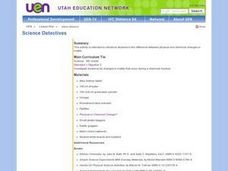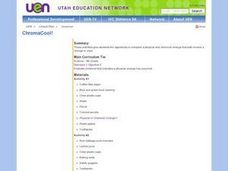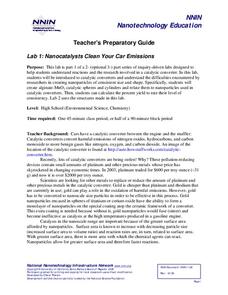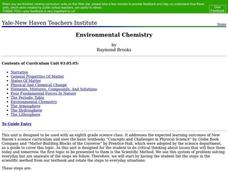Curated OER
Science Detectives
Fifth graders examine the differences between chemical and physical changes. As a class, they are read a scenerio and determine whether it was deliberate act or not. In groups, they observe the changes of an alka-seltzer tablet and...
Curated OER
Equilibrium, Enthalpy and Entropy
In this chemical reactions worksheet, young scholars determine what is true about a system at equilibrium and give examples of macroscopic properties. Students determine minimum enthalpy and maximum entropy for reactions. This worksheet...
Curated OER
Chemical Equations
In this chemical equations worksheet, students predict the major organic products of given reactions. Students give the mechanism for reactions. Students also give the product for ozonolysis of given alkenes. This worksheet has 7...
Curated OER
ChromaCool!
Fifth graders watch a video about physical and chemical changes. In groups, they participate in a variety of activities involving color. They write their observations in a journal. To end the lesson, they use a checklist to classify...
Curated OER
Household Chemicals
In this chemicals worksheet, students review how to read chemical labels, define an acid-base indicator, and decide which way strong acids can be dangerous. This worksheet has 15 short answer and 20 fill in the blank questions.
Curated OER
Chemical Equations
In this chemical equations activity, students determine the empirical formulas for chemical compounds and balance chemical equations. This activity has 1 fill in the blank question and 4 problems to solve.
Curated OER
Explosives
Students assume the role of police detectives and investigate chemical agents used to make explosives and suspected terrorists based on information provided. Students have a list of questions to lead their investigation and must produce...
American Chemical Society
Development of Baking Powder
Did you know baking powder can be used to treat acne, whiten teeth, and make sugar cookies? The lesson plan on the development of baking powder is ready-to-go with no preparation required. Through readings, pupils answer questions,...
Curated OER
Lab Tests, Results, and Sulfuric Acid
You may want to change the title of this chemistry PowerPoint to "Identifying Compounds in the Laboratory." Individual slides explain tests that can be performed to confirm what element you have: carbon dioxide, carbonates, and metal...
Science Geek
Atomic Structure
The International Union of Pure and Applied Chemistry (IUPAC) was formed in 1919 and was crucial for allowing scientists to discuss findings during the Cold War. A presentation offers an introduction to atomic structure including the...
Cornell University
Polymers: Making Silly Putty
Putty is proof that learning can be fun! Share the wonderful world of polymers with your class through an experiment. Young scientists create their own silly putty, then examine its properties.
National Nanotechnology Infrastructure Network
Lab 1: Nanocatalysts Clean Your Car Emissions
What a big job for such a small particle. Young scientists learn about the role of nanoparticles in catalytic converters for cars. They conduct an experiment to create alginate-MnO2 catalytic spheres.
Exploratorium
Indicating Electrolysis
Sure, your learners know water is made up of two molecules, but watching them separate helps the class see the construction like never before. This resource provides directions on how to build a simple electrolysis device using a...
Pingry School
Replacement of Hydrogen by a Metal
As the most abundant element on the earth, hydrogen requires no replacement. Yet scholars learn to replace hydrogen with a metal to liberate the hydrogen gas. A simple procedure and data table include the necessary information and...
Biology Junction
Bioenergetics
Bioenergetics strives to describe how living things gain and transform energy for biological purposes. First, pupils learn about the types of energy before exploring the importance of energy in biological processes. Next, they discover...
Curated OER
Heat of Formation
In this reactions worksheet, learners calculate the heat of reaction for given chemical reactions. This worksheet has 3 problems to solve.
Curated OER
Chemistry: Plastic Milk
Students observe a basic chemical reaction as vinegar is mixed with skim milk and microwaved. First, they listen to the teacher read, "Little Miss Muffet," and discover the meaning of curds and whey. While the experiment have an...
Curated OER
The Chemistry of Life
In this chemistry of life activity, students will review key terms of plant cell structure and chemistry by reading 13 clues to complete the puzzle. Word bank is included.
Curated OER
Studying Exothermic and Endothermic Reactions
Pupils explore the mesosphere and lower thermosphere globally and achieve a major improvement in our understanding of the fundamental processes governing the energetics, chemistry, dynamics, and transport of the atmospheric region. They...
Curated OER
Environmental Chemistry
Eighth graders are introduced to the topic of Environmental Chemistry. In groups, they review the steps within the scientific method and develop their own hypothesis and design an experiment. They solve equations related to the...
Curated OER
The Energy Debate - Energy of Peanut
Learners articulate the difference between the terms heat and temperature. They calculate the amount of energy associated with a given temperature rise and design an experiment to measure the energy of a fuel.
Curated OER
Catalase and Catalysis
Learners explore enzyme catalysis through a series of experiments. In this chemistry lesson plan, students determine the factors affecting catalysis. They explain the different uses of this process.
Curated OER
Are All Equilibria Created Equal
In this equilibrium instructional activity, students read about the factors that effect equilibrium in solutions such as the pressure of the solution, the temperature and the concentration of the solution. They answer three multi-part...
Curated OER
Creating an Enzyme-Substrate Model
Students explore the reaction rates of an enzyme-mediated reaction through experimentation. In small groups, they use everyday objects to demonstrate the effects of environmental variables on enzyme function.
Students graph and...

























